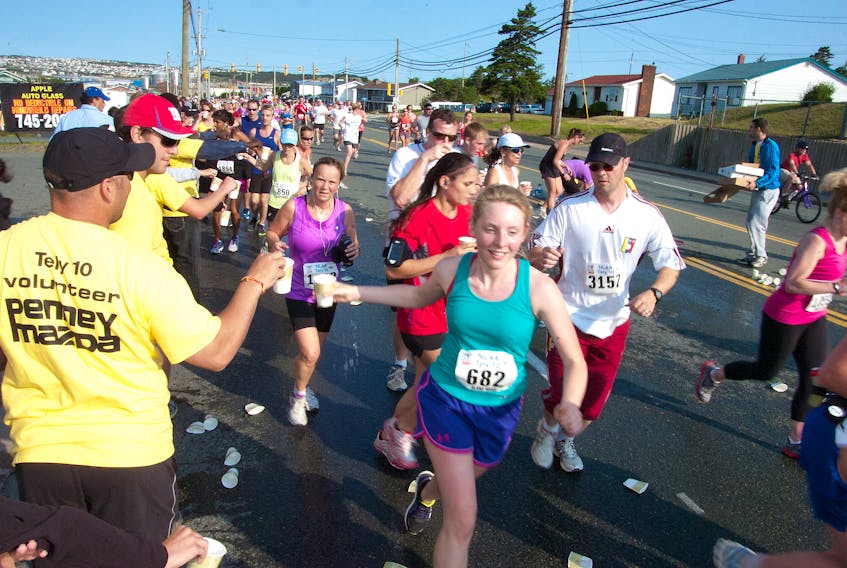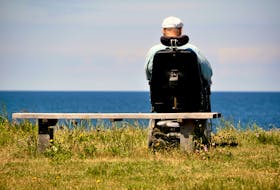Saltwire Network meteorologist Cindy Day is forecasting high humidity and low wind for the Tely 10 on Sunday morning. Runners and walkers should prepare accordingly.
Day predicts it will stay warm overnight on Saturday and be around 18 C when the race begins Sunday at 8 a.m., reaching 22 C by noon. The real challenge for participants will be the humidity, which is expected to be 70-80 per cent.
“Late July is always a tricky time for running in Newfoundland,” says Art Meaney of the Running Room in St. John’s.
He says it is commonly hot and humid this time of year.
“Make sure you hydrate properly leading up to the race,” says Meaney.
He explained that it is important to drink water regularly throughout the week leading up to the race, while being careful not to overhydrate and flush out electrolytes essential for making it to the finish line.
During the race Meaney recommends carrying a water bottle or stopping at water stations when necessary to combat the effects of the humidity. He cautions against partaking in sports drinks such as Gatorade, which will be available at some water stations, if you have not been drinking them while training, as they can cause stomachaches.
Dr. Dick Barter, a former rugby player, emergency room doctor and member of the Broken Earth team at Memorial University, explains that different people metabolize fluid differently, but recommends drinking two to three litres of water throughout the day during the two or three days prior to the race to be properly hydrated heading to the start line, and to give the body time to adjust to consuming larger quantities of water.
It is important to eating nutritious food that will replace salt loss in addition to drinking water, he added.
Barter says runners should avoid dehydrating fluids such as alcohol or coffee prior to the race.
Two problems Barter identified regarding hydration that commonly plague runners are overhydrating and consuming large amounts of water during the race.
Overhydrating dilutes the body’s necessary salts and can result in a collapse. To combat this, he recommends combining water with some salt and a bicarbonate such as baking soda.
Barter explained that during a strenuous physical activity like running, the body uses all of the blood supply for its muscles, and will not be able to absorb liquid in the same way. This means large amounts of water consumed on the course will “slop around in your stomach,” so it is best to take small sips of water periodically, he said.
The biggest thing about running on a humid day, Barter said, is to try to keep your core temperature down to avoid heatstroke.
Throwing water on the top of your head and other parts of your body can help to lower core temperature. Sweat acts as a natural cooling mechanism for the body, and Barter recommends that runners fight the urge to wipe it away, because allowing it to remain on the skin will protect against heatstroke and cause you to produce less sweat.
“Don’t ignore the signs,” says Barter.
He says, if you normally sweat, and stop sweating or are getting very hot but not producing sweat, and start to feel wobbly, it is important to stop, have some water, and allow time for your body to absorb it before starting again. If you are feeling very overheated and wobbly, you should stop running and find a medical professional, he says.
Conserve energy
Day forecasts a mix of sun and clouds, with a possibility of rain in the afternoon, so participants will not have to worry about needing rain gear during the race.
Regarding apparel, Meaney recommends wearing light, breathable clothing such as shorts and tank tops. Double-layered socks can help to prevent blistering, which is not uncommon on hot days.
To shield from the sun, it can be good to wear a light, vented cap that won’t cause the head to overheat and/or sunglasses. Body Glide and Vaseline can also be good for protecting against places where clothing tends rub.
“Don’t experiment on race day,” says Meaney.
With clothing and equipment, as with fluids, he cautions against wearing anything you have not previously run with to avoid unwelcome surprises.
To meet time goals, Meaney explained it is better to be conservative at the beginning of the race and pick up the pace as you go rather than burning all your energy at the start.
Following the race, both Meaney and Barter recommend having water, juice or a sports drink and food such as bananas or granola bars, which can aid the body in recovery.
Barter says to let your urine be your guide, and to ensure is has returned to a light colour before consuming that post-race beer.









